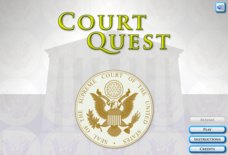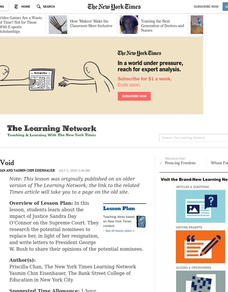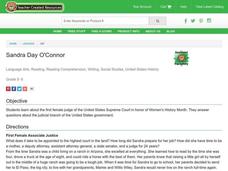State Bar of Texas
Marbury v. Madison
Who has the final say in matters dealing with the rules under the United States Constitution? The case Marbury v. Madison brings to light the issue of judicial review. Learners investigate the Supreme Court's opinion in the case with a...
Curated OER
Landmark Supreme Court Cases And The Constitution
Have an engaging class discussion on the Bill of Rights, U.S. Constitution, and the Supreme Court. Learners examine multiple aspects of the Marbury v. Madison case and the impact that case had on the judicial system in the U.S. Web...
iCivics
Court Quest
Introduce your learners to the federal and state court systems with a fun, interactive online video game! After reading sample cases, class members identify to which court the case should be assigned and gain a greater understanding...
Judicial Learning Center
Getting Ready for Trial
A courtroom can be a scary place for the uninitiated. Get familiar with the process using a helpful overview of the activities that take place prior to both civil and criminal cases. The lesson explains the differences between civil and...
Curated OER
Judicial Void
Students explore the impact of Justice Sandra Day O'Connor on the Supreme Court. They research potential nominees to replace her, in light of her resignation, and write letters to President George W. Bush to share opinions of the...
Curated OER
Branches of Government Worksheet
This is a basic multiple choice activity. Learners answer a set of 9 multiple choice questions about early colonists and branches of government. You might use this as a check for understanding or a quick quiz. The first 2 questions are...
Curated OER
Sandra Day O'Connor
No unit on important women in history would be complete without a activity on Sandra Day O'Connor. After reading background information about the first female Supreme Court justice, middle schoolers engage in several activities...
National Constitution Center
Separation of Powers
Learners explore how the Constitution provides for separation of power and limited government, as evidenced by the three branches of government. They participate in role-playing situations, group discussions, and complete worksheets to...
iCivics
Separation of Powers
In a fun and informative simulation, your learners will act in groups as lead chefs, menu writers, and nutrition inspectors in deciding a new school lunch menu. They will then compare and contrast their experience to the interaction...
Florida Center for Reading Research
Fluency: Connected Text, Practice and Read
A reading activity boosts scholars' level of fluency while reading connected text. Working collaboratively, pairs read a word list three times and a specific text while their partner gauges their accuracy and speed.
iCivics
The Road to Civil Rights
Here is a fantastic resource on the civil rights movement! It includes reading materials and worksheets, and particularly highlights major legislation and the role of the judicial branch in the federal government in addressing the...
Curated OER
Lesson 2: The Constitution: Our Guiding Document
Explore the structure and content of the US Constitution in the second lesson of this five-part social studies series. A collection of activities, games, and videos complement a class reading of a document summarizing the US...
School Improvement in Maryland
Dividing the Powers of Government
Who does what? To develop an understanding of the balance of power between the US federal and state governments, class members research responsibilities in terms of legal systems, security issues, economic activities, lawmaking, and...
Bill of Rights Institute
Celebrate Constitution Day
September 17 is a great day to focus on the US Constitution for on this day in 1787, the Constitution was signed. Through a series of activities, high schoolers get a chance to look closely at this famous document and the rights and...
Street Law
The Challenge of Selecting an Ideal Supreme Court Nominee
Nearly every president has had the opportunity to name a nominee to the United States Supreme Court. But what makes someone an ideal candidate to become a Supreme Court justice? High schoolers test their prior knowledge about the Supreme...
Federal Judicial Center
Amistad and Dred Scott—a Comparative Activity
What do slaves fighting for their freedom on board a ship and a slave fighting for his freedom in a courtroom have in common? Budding historians investigate the two different cases of the Amistad slave revolt and the Dred Scott argument....
Odell Education
Reading Closely for Textual Details: "We, as a people, will get to the promised land!"
Take another look—there are probably more details than readers realize. Scholars analyze nine texts in a five-part unit that contains 21 activities to find textual details. Activities include close reading, independent reading,...
National Endowment for the Humanities
Lesson 4 James Madison: Internal Improvements Balancing Act—Federal/State and Executive/Legislative
Who has the power? The founding fathers asked the same question when the United States was formed. Learners explore issues that arose during Madison’s presidency that raised constitutional questions. Through discovery, discussion, and...
Curated OER
iCivics: Court Quest
Learners explore the responsibilities of the Supreme Court. In this judicial branch lesson, students play an online game that requires them to respond to questions regarding the Supreme Court's responsibilities.
Curated OER
What Makes a Good Judge?
Students define qualities that should be considered when selecting judge, evaluate costs and benefits of two methods of selecting and retaining judges, decide whether methods provide for judicial independence
and judicial accountability,...
Curated OER
Symbolic Speech
Ninth graders consider the right of freedom of speech as it is outlined in the U.S. Constitution. They receive background information for the US Supreme Court, the Bill of Rights, and free speech. They discuss a series of actual cases...
Curated OER
Is Government Necessary?
Learners investigate the purpose of Congress and determine how it affects them. They explain what life would be like without government.
Curated OER
From Tinker to Fraser: Freedom of Speech in Public Schools
The Tinker and Fraser cases were taken the Supreme Court on the basis of the 1st Amendment right to Freedom of Speech. Learners discuss each case, the First AMendment, complete handouts, and conduct a role play activity. Handouts are...
Judicial Learning Center
About Federal Judges
Not just anybody can do the job of a federal judge, but according to the United States Constitution just about anybody can be appointed. The lesson outlines the process and requirements for becoming a federal judge, focusing on the...

























